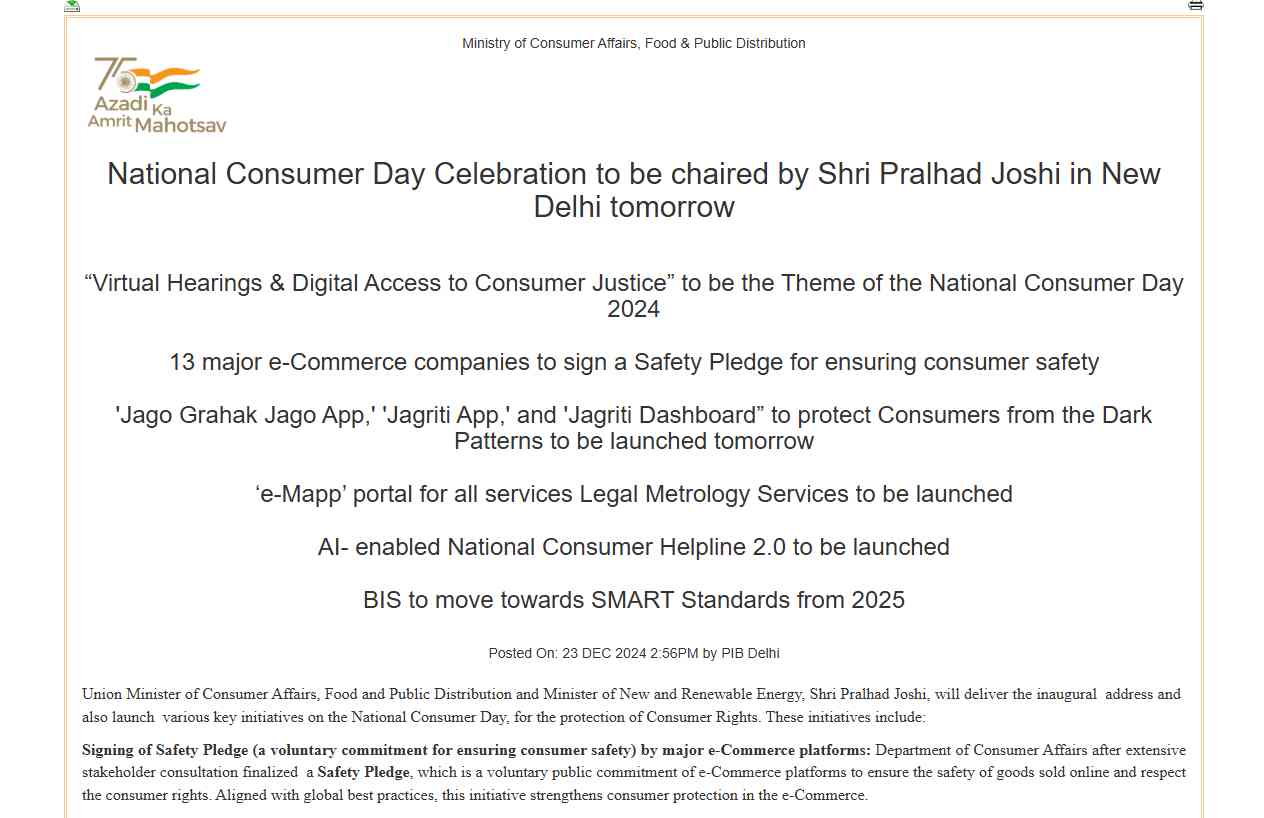National Consumer Day is celebrated in India every year on December 24. It marks the day when the Consumer Protection Act of 1986 was enacted. This law protects consumers' rights and ensures fair practices in the marketplace.
The day highlights the importance of consumer awareness and empowerment. It reminds people to know their rights while buying goods or services. The government, organisations, and activists work together to educate citizens about their rights.
National Consumer Day is also a call to businesses to follow ethical practices. It promotes fairness, transparency, and accountability.
This day encourages everyone to be vigilant and responsible consumers, ensuring a fair and just marketplace for all.
See More| World Consumer Rights Day 2024: What Are Common Consumer Rights Around the World You Need to Know?
Why is National Consumer Day celebrated on December 24?
National Consumer Day is celebrated in India on December 24 each year to commemorate the enactment of the Consumer Protection Act of 1986.
This legislation received the President's assent on this date, marking a significant milestone in consumer rights protection in India.
On the occasion of #NationalConsumerRightsDay, let's celebrate the importance of consumer empowerment.#ConsumerProtection #JagoGrahakJago pic.twitter.com/RSdRbpcxpV
— India Post (@IndiaPostOffice) December 24, 2024
The primary purpose of National Consumer Day is to raise awareness about consumer rights and responsibilities, as well as to promote fair trade practices.
The day serves as a reminder of the importance of safeguarding consumer interests against unfair practices such as overpricing, adulteration, and misleading advertising.
Theme of National Consumer Day 2024: What Does It Mean?
The theme for National Consumer Day 2024, celebrated on December 24, is “Virtual Hearings & Digital Access to Consumer Justice.”
This theme emphasises the importance of leveraging technology to enhance consumer protection and ensure that consumers have access to justice in an increasingly digital marketplace.
Significance of the Theme
- Digital Transformation: The theme reflects the growing reliance on digital platforms for consumer transactions and the need for effective mechanisms to address grievances that arise in these environments. It highlights the government's commitment to adapting consumer protection laws to the realities of online commerce.
- Consumer Empowerment: By focusing on virtual hearings, the theme aims to empower consumers by making it easier for them to seek redressal for their complaints without the need for physical presence, thereby reducing barriers to justice.
- Government Initiatives: On this day, various initiatives will be launched, including apps like 'Jago Grahak Jago' and 'Jagriti,' aimed at enhancing consumer awareness and protection in the digital age.
Key Consumer Rights You Should Know
Understanding consumer rights is essential for protecting oneself in the marketplace. Here are the six key consumer rights recognised in India under the Consumer Protection Act, 2019:

- Right to Safety: Consumers have the right to be protected against goods and services that are hazardous to their health and life. This ensures that products meet safety standards before they reach consumers.
- Right to Be Informed: Consumers have the right to receive adequate information about the quality, quantity, potency, purity, price, and standard of goods and services. This empowers them to make informed choices and avoid deceptive practices.
- Right to Choose: Consumers should have access to a variety of goods and services at competitive prices. This right ensures that consumers can make selections based on their preferences without coercion.
- Right to Be Heard: Consumers have the right to express their grievances and seek redressal. This means that their complaints should be acknowledged and addressed by the relevant authorities or service providers.
- Right to Seek Redressal: Consumers can seek compensation for unfair trade practices or exploitation. This includes the right to file complaints against sellers or manufacturers for defective goods or inadequate services.
- Right to Consumer Education: Consumers have the right to acquire knowledge and skills necessary to make informed decisions regarding goods and services. This education helps consumers understand their rights and responsibilities better.
These rights are designed to empower consumers, ensuring they can navigate the market confidently while holding businesses accountable for their practices.
Also Read| Forbes List of 30 Under 30 In Consumer Technology In 2024
Comments
All Comments (0)
Join the conversation